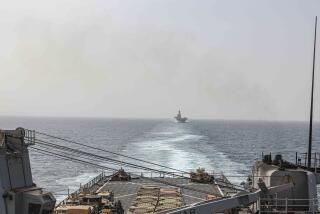Violence in Bahrain, Yemen; Oman’s ruler cedes some power
- Share via
Reporting from Manama, Bahrain — — Police fired tear gas to disperse hundreds of anti-government demonstrators blocking access to the financial district of Bahrain’s capital on Sunday, as sectarian tension escalated in this tiny island kingdom.
The clashes began early Sunday after protesters set up barricades across a main road into downtown Manama and turned away motorists headed for work. Dozens of policemen in riot gear forced the demonstrators back in a series of clashes over two hours, witnesses said.
Elsewhere in the region, confrontations between protesters and security forces continued in Yemen, and Oman’s ruler responded to demonstrators by giving some governing power to officials outside the royal family for the first time.
The decision in Bahrain by several hundred demonstrators to block the road appeared to be an effort by some members of the opposition to broaden the protests and escalate the pressure on the government. But there were also signs of growing sectarian strains, as a group of Shiite Muslim protesters clashed with Sunnis armed with sticks at Bahrain University, witnesses said.
The Persian Gulf kingdom, home to the headquarters of the U.S. Navy’s 5th Fleet, has seen weeks of demonstrations led by Shiites, who make up a majority of the population but say they are discriminated against by the Sunni royal family.
Despite the growing tensions, the protest movement in Bahrain remains deeply split and, so far, unwilling to take up the government’s offer for talks to resolve their grievances.
The confrontations Sunday were among the most violent since the military killed seven protesters Feb. 17. They followed similar clashes Friday when security forces fired what protesters said were rubber bullets, and pro-government gangs armed with sticks beat back several hundred protesters near the royal palace.
When word of Sunday’s confrontation near the financial district spread, dozens more young men joined the barricades and fought a running battle with police, witnesses said, before falling back to Pearl roundabout, the traffic circle occupied by protesters last month.
“We made a human wall, and they attacked us,” said Jafar Mosaed, who said he was heading to his job at American Express before parking his car and joining the protests. “We retreated, and they attacked us again.”
There were reports of dozens of injuries among protesters, as well as injuries to police. A policeman was stabbed by a protester, the government said. Demonstrators displayed hundreds of canisters of tear gas that they said had been fired Sunday.
Several protesters warned that the government was deliberately fomenting sectarian tensions, in part to stoke fear that Shiite-dominated Iran would benefit if demands for greater political power by the protesters in Bahrain were met.
The new clashes came a day after U.S. Defense Secretary Robert M. Gates met with the king, Hamed ibn Isa Khalifa, and urged the government to undertake reforms to prevent Iran from exploiting the unrest. Gates is the highest-ranking U.S. official to visit Bahrain since the protests began.
Gates said there was no evidence Iran had been involved in starting the protests but that the longer they went on, the more Tehran could benefit.
In Yemen, government forces launched an unsuccessful attempt to shrink a huge sit-in near Sana University among people calling for the immediate ouster of President Ali Abdullah Saleh.
The security forces launched a tear gas attack in the afternoon and were joined by men in plain clothes who shot at the protesters with live ammunition from the ground and rooftops. The government disavowed any affiliation with the thugs, but the security forces appeared to be offering them cover.
Ten people were injured by the bullets, and hundreds more sought medical attention after exposure to tear gas.
In Oman, Sultan Qaboos bin Said granted legislative and auditing power to the state council, a body that previously served just an advisory role, the state news agency reported.
The new power for the council, which consists of elected and appointed members, was the sultan’s latest maneuver as he attempted to deal with the most serious civil unrest seen since he took power from his father in 1970.
Special correspondent Haley Sweetland Edwards in Sana and Times staff writer Garrett Therolf in Cairo contributed to this report.
More to Read
Sign up for Essential California
The most important California stories and recommendations in your inbox every morning.
You may occasionally receive promotional content from the Los Angeles Times.











